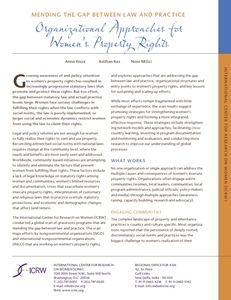Landownership and food security in Uganda
Women in Uganda, especially widows, disproportionately suffer the impacts of AIDS because of their disadvantaged position due to sociocultural factors. Some of the key factors impacted by the disease are food security, self-esteem, income, and assets, like landholdings. Land is mainly lost in land-grabbing by relatives of the deceased husband, although other factors, such as distress sale, often come into play. The situation is aggravated by the weak policy and implementation framework for protecting the property rights of women and children.







